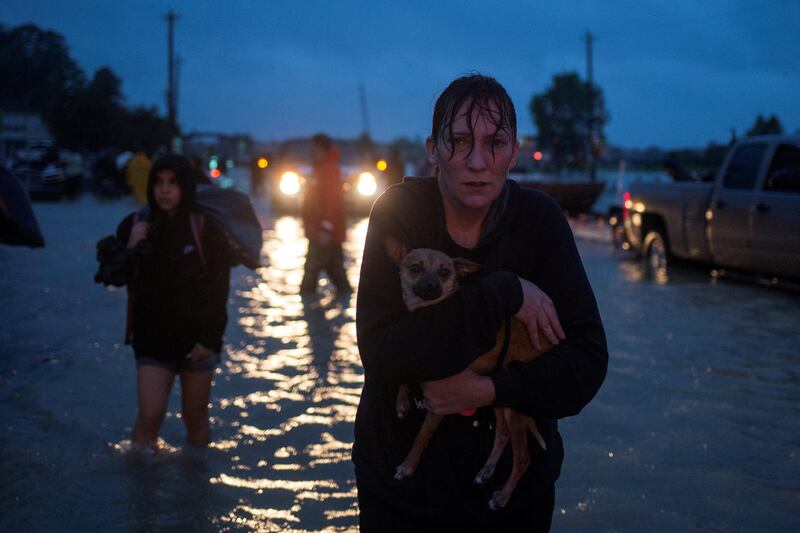Climate change has run into a massive problem. It has allowed itself to be treated as a science of certainty rather than an art of probability. Within that chasm falls the overly heated, doom-laden debate about what to do and whether to do it at all.
Consider the recent flooding in Houston. It has been described as a once-in-500-year event, which is to say there was a 0.2 per cent chance in any one year a flood of that magnitude would occur where it did. That it happened is being ascribed to climate change but no one can show a definitive causal link.
It's the same with last month's torrential rains in Sierra Leone, which caused a mudslide that killed more than 1,000. So too this year's unusually heavy rains in South Asia, which caused massive flooding, left at least 1,200 people dead and displaced millions. In that part of the world, the monsoon or rainy season is an annual feature, and often, so is flooding. But this year's rains are said to be the worst in recent times.
Again, no one can explicitly prove the Sierra Leone or South Asian disasters occurred because our climate is changing. But the suggestion of abnormality – rising sea surface temperatures leading to more moisture in the atmosphere – revolves around the now well-worn narrative of global warming.
This is a problem even though we know, mostly through reinsurers like Munich Re, that weather-related disasters such as storms and floods have increased from about 200 in 1980 to over 600 last year.
_________________
Read more from Rashmee Roshan Lall
[ Diana's legacy rests on a fairytale that does not reflect reality ]
[ Pakistan and India at 70: Is this a moment to be proud or to mourn lost opportunities? ]
[ Donald Trump's "path forward" in Afghanistan is a rebrand not a step ahead ]
_________________
The trouble with tying each extreme weather-related event too tightly to climate change is that it calls for extreme solutions. It asks that men move mountains overnight, or in terms of weather, to cease forthwith any activity that exacerbates global warming.
This is unrealistic, even with the best will in the world and the ambitious Paris Climate Agreement now ratified by 160 of the 197 signatory parties to the convention. For temperatures to stay at current levels, carbon emissions worldwide must cease by 2020, bringing all economic and human activity to a halt. This is hardly desirable, or likely, even if it were agreed by every country and implemented in good faith.
So, what is to be done? On one side stands an intemperate phalanx of climate change sceptics, led by US president Donald Trump, whose country is the world's second biggest polluter. Ranged against them is the Madre Tierra brigade, aggressively promoting recycling and renewables for mother earth.
Is there any common ground to be had?
Yes, and it comes from an academic who pithily styles himself "the skeptical environmentalist". Danish professor Bjorn Lomborg, who runs the Copenhagen Consensus on Climate project, argues that the hype and hysteria around climate change should give way to a common sense solution. "Instead of trying to make fossil fuels so expensive that no one wants them," Prof Lomborg recently said, "we should make green energy so cheap everybody will shift to it."
_________________
Read more from Opinion
[ A war with Hizbollah would essentially mean war with Iran ]
[ Small-scale philanthropic initiatives do make a world of difference ]
_________________
There is an undeniable logic and elegance in that line of argument. It stands to reason that re-allocating climate change funding to research in green energy would render it cheaper and more irresistible than every other fuel source. Additionally, it would neutralise some of the anti-fossil fuel militancy that has allowed Mr Trump, for instance, to equate climate concerns with an anti-jobs agenda inimical to American interests. If green energy research and roll-out became a mass, commercially attractive venture, market forces would serve as shock troops of the raging eco wars.
In some ways, the search for cheap, concentrated sources of green energy is already heating up. The UAE and Morocco are pioneering the use of concentrated solar power technology. And Australia and Japan are harnessing sunlight to power the "hydrogen economies" of tomorrow. But, we are a long way off from turning – naturally and inevitably – towards green energy sources. They are neither plentiful nor inexpensive. As the Paris-based intergovernmental International Energy Agency noted in its 2016 report, just 0.6 per cent of the world's energy is supplied by solar and wind. Were the Paris accord to be whole-heartedly implemented, solar and wind power would still account for only three per cent of world energy by 2042.
That makes no sense when climate change has become an urgent concern, albeit for different reasons, for evangelists and sceptics alike. Meanwhile, we struggle with six times more hydrological events now than in 1980. We face stormier weather, more often. And more frequent droughts that stretch longer, imperilling multiple years’ harvests rather than just one.
The battle lines over climate change are drawn and the worry is we’re fighting each other rather than the threat to our environment. It is time for a practical consensus. Disagreement on the science of climate change is allowed. But the art of the matter has to be a common sense solution.





